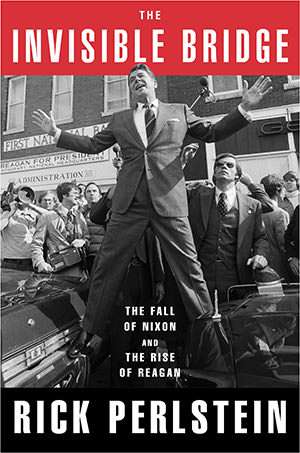Copyright Absurdity: Reagan Biographer Gets Paraphrased, Demands $25 Million
This week in preposterous legal threats

Craig Shirley, the author of two books on Ronald Reagan, has sicced his lawyer on Rick Perlstein, whose '70s history The Invisible Bridge was published by Simon & Schuster this week. Shirley's attorney is demanding that the publisher pulp Perlstein's book, pay $25 million in damages, and take out ads apologizing to Shirley in The New York Times, The Washington Post, Newsweek, The Nation, The New Republic, Slate, and Salon.
What provoked these demands? Basically, the 810 pages of The Invisible Bridge include some information that can also be found in Shirley's book Reagan's Revolution, and in some places Perlstein paraphrases Shirley. Shirley thinks this constitutes copyright infringement. If you'd like to read the bill of particulars, Dave Weigel has posted the attorney's letters and Simon & Schuster's response at Slate, and Shirley himself has posted a litany of alleged thefts on his website.
In the first item on the latter list, the two books do sound alike: Describing the red-light district in Kansas City, Perlstein echoes not just the info in Shirley's text but Shirley's words "festooned" and "smut peddlers." After that, though, we essentially get a list of places where the two writers cited the same facts. Facts are not copyrightable, and one pair of similar sentences does not an infringement make. I don't see a dollar's worth of damages here, let alone 25 million.
Perlstein has posted his source notes online, and they include dozens of citations to Shirley's book, often with direct links to the pages he's drawing on. So it's not as though he's trying to conceal where those facts were found. Shirley is upset that the references do not also appear in the physical text, but the book tells readers exactly where to find them. The worst you can say is that there are a few spots where the notes call Shirley's book "The Reagan Revolution" instead of "Reagan's Revolution." I believe the legal term for such an error is "a typo."
I have both praised and criticized Perlstein's writing in the past, and I'm writing a review of The Invisible Bridge which will both praise and criticize it some more. Mostly praise—I think it's a good book. But where I do find fault with it, I'll take issue with its arguments, not with the fact that it incorporates information from a text the author cites repeatedly.


Show Comments (25)